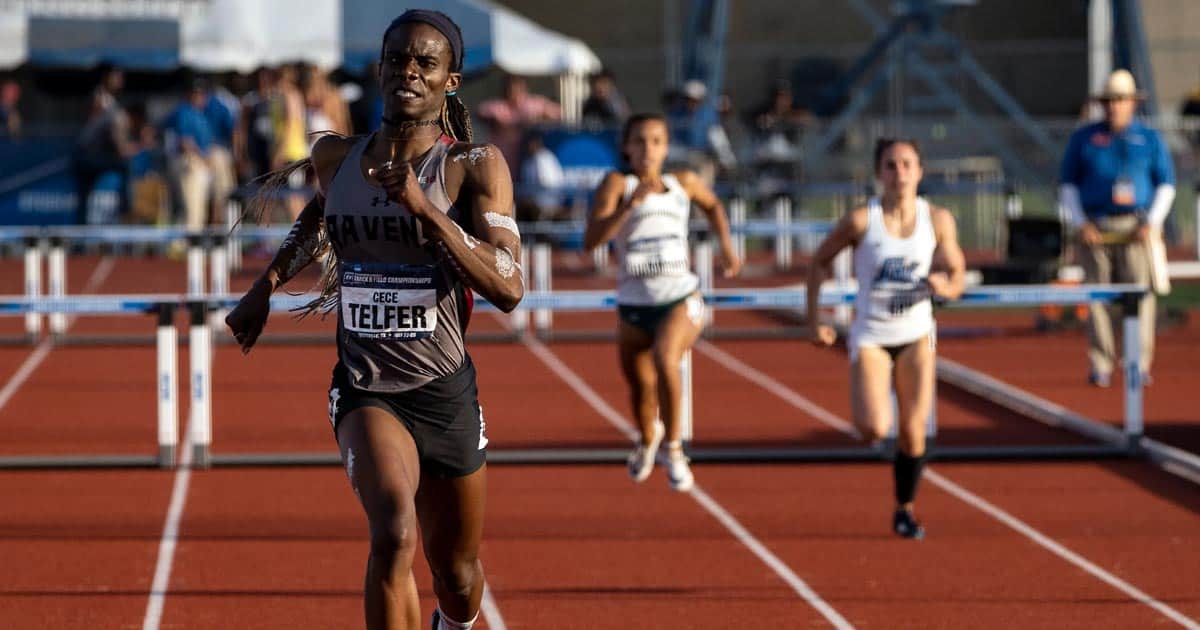A male runner has vowed that he plans to “take all the records” from real women while competing in female events.
CeCé Telfer, a male athlete who claims to be a transgender “woman,” previously caused outrage when he won an NCAA women’s track and field championship in 2019.
In a recent interview, he vowed to return to indoor competition and take victory from women.
Telfer sparked controversy earlier this year by winning women’s indoor track meets in the New England area.
However, with a new book out, Telfer vowed to take home more than just a medal.
“I look forward to indoor track because 2024 indoors is going to be epic,” he said in an interview with far-left gender ideology outlet Them.
“My dreams were taken away from me once again.
“So I plan on going back to New England, hitting up all the indoor competitions, and taking all the names, all the records, and everything.
“That doesn’t look like first all the time, that doesn’t look like second place, that doesn’t look like podium all the time, but the track meets that count will count.
“That’s what’s burning this fire in my heart and in my body.
“So it’s keeping me going to know that I can go to indoor competitions and still be the girl to talk about, period.”
The NCAA has yet to outline specific rules regarding transgender athletes in sports.
The governing body said it would follow the U.S. Olympic and Paralympic Committee.
Each sport would follow the national governing body for each sport, the NCAA stated.
If there was no national governing body, then each sport would abide by the international policy.
The NCAA updated its transgender policy starting on Jan. 19, 2022, and the final implementation begins on Aug. 1.
Earlier this year, the National Association of Intercollegiate Athletics (NAIA) banned transgender athletes (men) in women’s sports, as Slay News reported.
The NAIA said its decision was rooted in “fair and safe competition for all student-athletes.”
The organization also noted that “Title IX ensures there are separate and equal opportunities for female athletes.”
The NAIA said only athletes whose biological sex is female may participate in “NAIA-sponsored female sports.”
The policy goes into effect on August 1.
Telfer, who competed for Franklin Pierce University, said he was “heartbroken” and “distraught” over the rules.
“Because I’m like, why are we going back?” he said.
“Why are we reverting?
“We’re literally going back in history.
“This is not real life, because we were moving forward and now we’re moving backwards.
“This is scary,” Telfer complained.
“The fact that people are powerful enough to move backward is scary, not only for transgender women, but it should be scary for society at large because people think that [anti-trans advocates are] going to stop at transgender women.
“No. They’ve always been policing women’s bodies.
“It’s going down to cis women and what’s going on in their lives and their bodies.
“It breaks my heart because I had an opportunity.
“The NCAA saw me,” he claimed.
“They gave me a chance to be that voice and be that physical change, and they were taking a step in the right direction and obviously creating history, hoping that other organizations would follow.”
Despite his frustrations, Tefler has no intention of applying to compete in the men’s events.

Our comment section is restricted to members of the Slay News community only.
To join, create a free account HERE.
If you are already a member, log in HERE.
Recommended